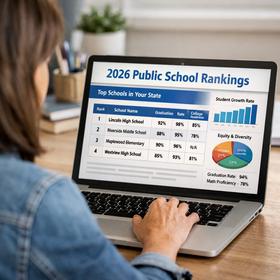Coral Gables Preparatory Academy, formerly Coral Gables Elementary School, is a public K-8 school in Coral Gables, Florida.
Serving 828 students in grades Prekindergarten-8, Coral Gables Preparatory Academy ranks in the top 20% of all schools in Florida for overall test scores (math proficiency is top 20%, and reading proficiency is top 20%).
The percentage of students achieving proficiency in math is 72% (which is higher than the Florida state average of 52%). The percentage of students achieving proficiency in reading/language arts is 76% (which is higher than the Florida state average of 52%).
The student-teacher ratio of 18:1 is higher than the Florida state level of 17:1.
Minority enrollment is 85% of the student body (majority Hispanic), which is higher than the Florida state average of 65% (majority Hispanic).
Quick Facts (2026)
- Grades: Prekindergarten-8
- Enrollment: 828 students
- Student-Teacher Ratio: 18:1
- Minority Enrollment: 85%
- Overall Testing Rank: Top 20% in FL
- Math Proficiency: 72% (Top 20%)
- Reading Proficiency: 76% (Top 10%)
- Science Proficiency: 75-79% (Top 10%)
- Source: National Center for Education Statistics (NCES), FL Dept. of Education
Top Rankings
Coral Gables Preparatory Academy ranks among the top 20% of public schools in Florida for:
Category
Attribute
Overall Rank
Math Proficiency
Reading/Language Arts Proficiency
Science Proficiency
School Overview
Coral Gables Preparatory Academy's student population of 828 students has declined by 10% over five school years.
The teacher population of 45 teachers has declined by 19% over five school years.
Grades Offered
Grades Prekindergarten-8
(No virtual instruction)
(No virtual instruction)
Total Students
828 students
Gender %
Total Classroom Teachers
45 teachers
School Calendar
Last Day of School
Fri. May 1, 2026
School Rankings
Coral Gables Preparatory Academy ranks within the top 20% of all 3,662 schools in Florida (based off of combined math and reading proficiency testing data).
The diversity score of Coral Gables Preparatory Academy is 0.32, which is less than the diversity score at state average of 0.70. The school's diversity has stayed relatively flat over five school years.
Overall Testing Rank
#426 out of 3662 schools
(Top 20%)
(Top 20%)
Math Test Scores (% Proficient)
72%
52%
Reading/Language Arts Test Scores (% Proficient)
76%
52%
Science Test Scores (% Proficient)
75-79%
52%
Student-Teacher Ratio
18:1
17:1
American Indian
n/a
n/a
Asian
2%
3%
Hispanic
81%
37%
Black
1%
21%
White
15%
35%
Hawaiian
n/a
n/a
Two or more races
1%
4%
All Ethnic Groups
Participates in the National School Lunch Program (NSLP)
Yes
Eligible for Free Lunch
28%
47%
Eligible for Reduced Lunch
3%
4%
School Statewide Testing
School District Name
Source: National Center for Education Statistics (NCES), FL Dept. of Education
Frequently Asked Questions
What is Coral Gables Preparatory Academy's ranking?
Coral Gables Preparatory Academy is ranked #426 out of 3,662 schools, which ranks it among the top 20% of public schools in Florida.
What percent of students have achieved state testing proficiency in math and reading?
72% of students have achieved math proficiency (compared to the 52% FL state average), while 76% of students have achieved reading proficiency (compared to the 52% FL state average).
How many students attend Coral Gables Preparatory Academy?
828 students attend Coral Gables Preparatory Academy.
What is the racial composition of the student body?
81% of Coral Gables Preparatory Academy students are Hispanic, 15% of students are White, 2% of students are Asian, 1% of students are Black, and 1% of students are Two or more races.
What is the student-teacher ratio of Coral Gables Preparatory Academy?
Coral Gables Preparatory Academy has a student ration of 18:1, which is higher than the Florida state average of 17:1.
What grades does Coral Gables Preparatory Academy offer ?
Coral Gables Preparatory Academy offers enrollment in grades Prekindergarten-8 (No virtual instruction).
What school district is Coral Gables Preparatory Academy part of?
Coral Gables Preparatory Academy is part of Miami-Dade School District.
In what neighborhood is Coral Gables Preparatory Academy located?
Coral Gables Preparatory Academy is located in the Coral Gables Section neighborhood of Miami, FL.
School Reviews
Review Coral Gables Preparatory Academy. Reviews should be a few sentences in length. Please include any comments on:
- Quality of academic programs, teachers, and facilities
- Availability of music, art, sports and other extracurricular activities
Recent Articles

Public School Rankings: Are They Accurate in 2026?
Are public school rankings accurate? Learn how rankings are calculated in 2026, what they miss, and how families can evaluate schools wisely.

How Are U.S. Public Schools Doing in 2026?
A 2026 update on how U.S. public schools are performing academically, financially, and socially in a post-pandemic era.

Helping Your Child Navigate Friendship Drama at School
Meta Description: Practical 2026 strategies for helping your child navigate friendship drama at school with confidence, empathy, and resilience.









